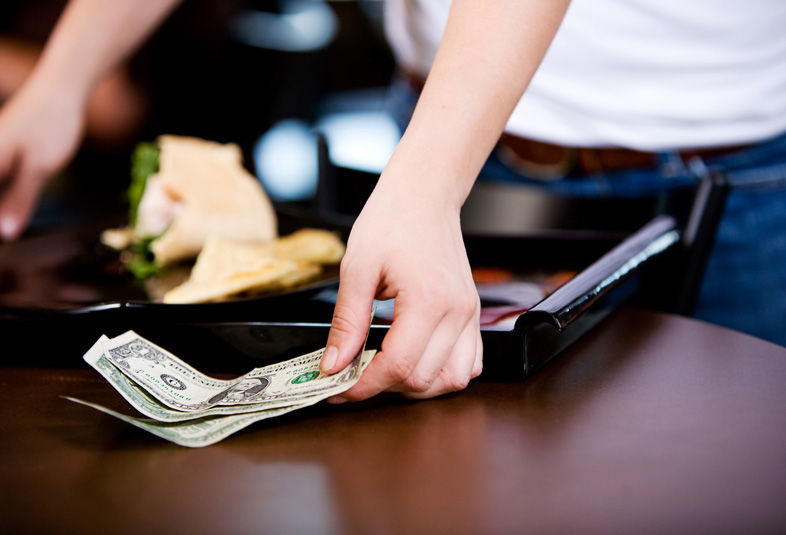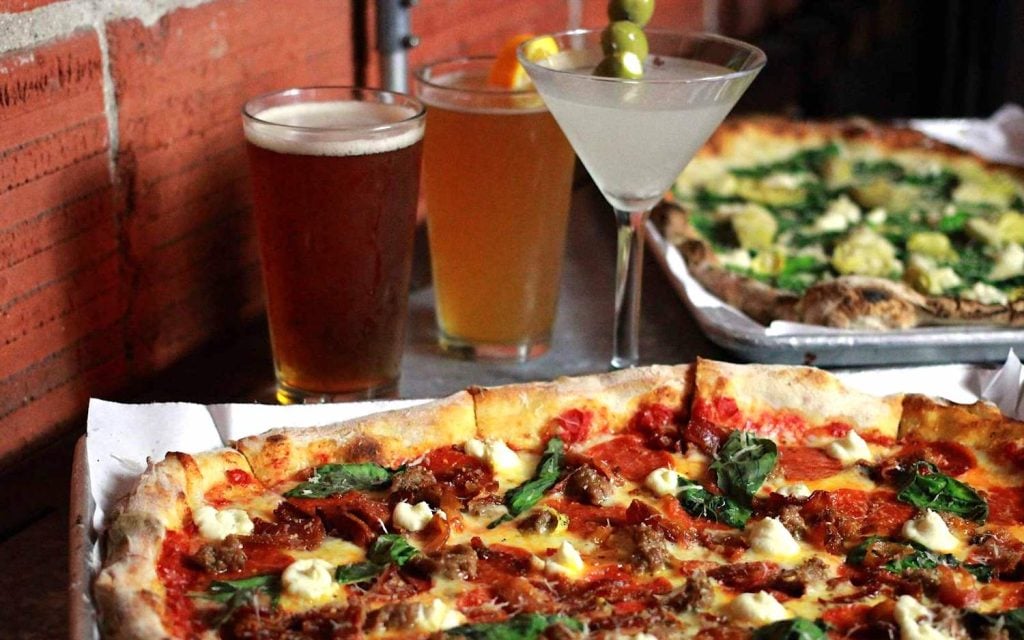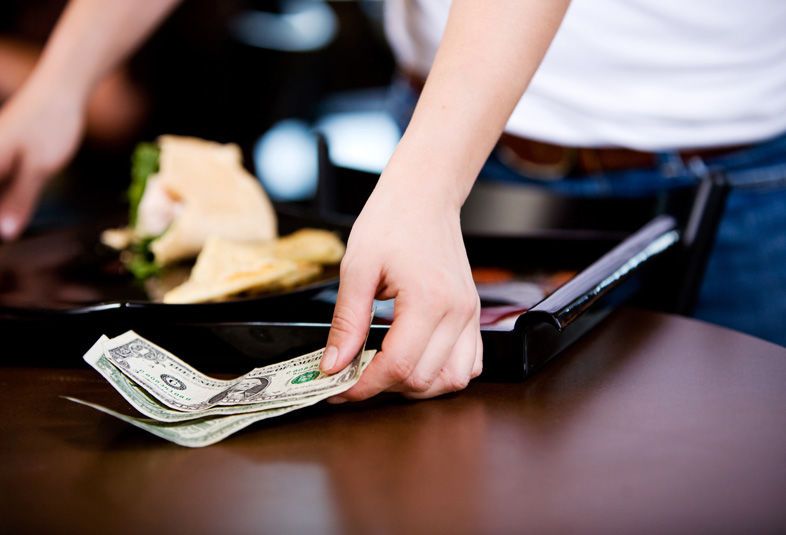Rising labor costs are the single biggest threat the restaurant industry has faced in a long, long time. The closing of two recent high-profile restaurants in San Diego has made it a hot topic again. Last year, I talked to dozens of experts to come up with fair solutions. Here, I’ve condensed all of my research and perspective on it into one space.
Last year, San Diego’s beloved Cafe Chloe closed after 14 years. Last week, iconic Urban Solace did the same. For two years, mom-and-pop restaurateurs have told me this would happen. And now it is.
There are many reasons restaurants close. But one reason comes up again and again—California is raising minimum wage without letting restaurant owners count tips as wages, and yet still taxing restaurateurs on those tips. It’s a financial double-whammy they can’t recover from.
I wish tips didn’t exist, for reasons like sexual harassment (ethically challenged diners think a $20 bill gives them the right to act badly), racism (minority servers are tipped less), and classism (it divides a restaurant into well-paid servers and near-poverty cooks and dishwashers). Ideally, the US would join most of Europe and Australia and embrace a no-tipping restaurant model. But unfortunately, that’s a major cultural shift that’s pretty far down the road (I’ll explain this further below). And mom-and-pops are dying on California’s current road. Since tips are staying around for a while, let’s address the current problem that’s putting restaurant owners and employees out of business.
There’s a very simple solution. But California refuses to do anything about it.
THE SOLUTION: Let restaurant owners and employees agree on a fair, livable wage. Ensure they make that wage, every single shift. Just count tips as part of that. As long as tips exist, the state should let restaurants count them as wages. Because that’s exactly what they are—money an employee earns directly as a result of their work, because the owner employs them.
Most restaurateurs I speak with have said they’ll pay more than minimum wage. So, what’s fair? $18/hour? $20/hour? $25? $30? Whatever the market demands, they agree on a number that makes an employee say, “Yes, that’s a fair, livable wage that I agree to. Enough for me to work here and pay my bills.” The restaurant then makes sure they pay the employee that fair, agreed-upon hourly wage—every single shift.
Let’s say they agree on $20/hour. At the end of the shift, count up the tips. If the employee made $20/hour or more in tips—the fair, agreed-upon wage—then the restaurant owner does not need to pay them any additional hourly wage. They can use that money to pay the truly underpaid people of any restaurant staff (cooks, dishwashers), pay bills, or (gasp) take a profit, which might eventually help them open another restaurant and create more jobs.
If the employee did NOT make the fair, agreed-upon wage in tips, the restaurant owner makes up the difference. Only made $5/hour in tips on a slow night? The restaurant owner pays that server $15/hour in addition to their tips to make up for the difference. That way they made the agreed-upon, fair $20/hour.
If an employee makes $40/hour in tips (at high-end restaurants, this happens), ideally the additional money would be split among all hourly employees on staff.
Agree on a wage the employee says is fair and livable. Make sure that employee is paid that wage—every single shift.
Over the last few years, I can’t tell you how many small-restaurant owners have emailed, texted, and called me about the same topic. The number is staggering. They’re hesitant to speak publicly, for fear they’ll be seen as greedy capitalists. In reality, they’re like Cafe Chloes and Urban Solaces—honest operators who are barely paying their bills, on the edge of closure.
They asked me to explain their story. I was hesitant. I believe everyone deserves a living wage. I fully supported California raising the minimum. After so many calls, I decided I had to look into it. If I determined they were merely poor business operators or whining, I wouldn’t rally for ineptitude or greed.
So last year I spent weeks poring over hundreds of pages of research into the matter. I talked to dozens of experts, analyzed the arguments for and against, spoke with State Assemblyman Todd Gloria.
The conclusion was pretty obvious: They were right. California lawmakers dealt a crushing, unnecessary blow to mom-and-pop restaurateurs. And now we’re seeing them close because of it.
This isn’t about greedy restaurant owners wanting to keep more money (surely, a few of them are, and will, but those are outliers). The restaurateurs that email me every week are not rich. They’re struggling, and simply saying to the state of California, “My server already makes $20/$30/$40 an hour. Will you please not force me to give them a raise? Can I give that raise to a dishwasher or cook instead?”
California has responded: Too bad.
Is simple math really that hard for California? Sure, it’ll take more accounting on the restaurant owner’s side, but most I speak to think it’s worth it.
Under California’s current laws, this simple math is illegal. The state does not allow owners to count tips as wages. The cruelest part about this—and why I accuse the state of willingly, knowingly killing mom-and-pop restaurants—is that the state taxes restaurant owners on those tips through payroll taxes. So they are telling restaurateurs, “You cannot count those tips as wages, but we’re going to count those tips as something you owe us taxes on.”
In what world is this right, just, fair, or even legal?
Minimum wage is rising incrementally each year until it reaches $15/hour in January 2022. Let’s say a server at a nice restaurant makes $31 an hour (minimum wage at $11, plus $20 an hour in tips). Come 2022, California will force the restaurateur to pay that server $4 more per hour. The server will be making $35/hour.
Meanwhile, the hard-working kitchen staff (dishwashers/cooks) are struggling near minimum wage, small restaurateurs are struggling to pay bills, restaurants are closing, would-be restaurateurs are moving to states that do count tips as income, and jobs are being lost or simply not created at all.
A high-end San Diego restaurateur told me one of his servers made $70,000 four years ago, working 30 hours a week. That is $44.87/hour. Come 2022, that server would be making nearly $50/hour. Granted, this wealthy server is an outlier. Plenty of servers at low-end restaurants are making less than minimum wage in tips. But, even as a server at California Pizza Kitchen in Carmel Mountain during the ’90s—a nice chain, but no Mister A’s—I made more than minimum wage in tips.
I’m not going to say that employee doesn’t deserve it. He’s apparently a great server, at a great restaurant, and the market deems him a valuable asset to the business. Good for him. But before California forces the restaurateur pay the server four bucks an hour on top of his $44, why don’t we take a look at the other people working hard at the restaurant?
Dishwashers and cooks get the shaft, as do their families. Tipped servers make double or triple what a cook or dishwasher makes. If California recognized tips as wages, a restaurateur could say to that server, “You’re already making $44 an hour. John in the kitchen is making $15 and that’s why I’m giving him a raise and not you.” So, under current law, California is hurting the people who need the raise the most. They are making them throw more money at their highest-paid employees—most of whom make well over minimum wage—at the cost of their lowest-paid people.
Until last year, it was actually illegal in California for servers to share their tips with kitchen staff (it’s now legal).
This is why 43 out of 50 US states have a “tip credit.” I’m not recommending a tip credit, which has its own set of problems and baggage. It does help, however, to understand why those 43 states believe tip credits are a fair solution. The concept is pretty simple. It means a state recognizes tips as wages a restaurant owner is providing their tipped employees. They pay them a lower hourly wage because tips make up the rest.
In reality, tip credits often don’t work. Servers at lower-end restaurants don’t end up making minimum wage, and shady operators abuse the system. California was probably right not establishing a tip credit. What they decided to do, however, is far worse, and it’s killing server jobs.
Again, abolishing tipping is my personal ideal—one supported by many in the industry. The system works in most of Europe and Australia. Everyone makes a fair and livable wage. The restaurateurs in those countries have been able to pay everyone fairly by charging more for menu items. It’s far costlier to dine out in those countries than in the US.
The problem is that Americans are far too accustomed to cheap food. The only way US restaurateurs are able to keep prices low is because tips have subsidized their employees’ wages. So to abolish tipping in the US would take an industry-wide coalition (I’ve never tried to form one of those, but it sounds hard), otherwise the first restaurants to try on their own would struggle mightily (they’d not only have to attract servers who are ok not earning tips, but also raise prices and attract customers who pay more—and employees and customers are more likely to go to restaurants who aren’t doing this). Or tipping would have to be made illegal, which would also take years.
Unfortunately, mom-and-pop restaurants don’t have that kind of time. They will lose their businesses by the time this happens.
The worst part is that California’s refusal to recognize tips as wages specifically hurts small restaurant owners the most. Cheesecake Factory will be just fine. Corporations and chains have the financial largesse to shoulder the cost. Indie restaurants do not. The state is killing small-business owners like Cafe Chloe and Urban Solace, whose owners spent years rejuvenating a struggling neighborhood, employing hundreds of locals along the way.
There’s an odd misconception that restaurant owners all leave dinner service early to drive their Porsches to their Champagne parties, while their underpaid workers trudge away. After two decades in this industry (as a dishwasher/busser/server/bartender, then a restaurant writer), I am certain that is not the case in the vast majority of restaurants.
Sure, there are the Danny Meyers and Nobus of the world. But they are wealthy outliers. Most small-restaurant owners I know work ungodly hours long after their staff has gone home. The economic return for their risk and struggle? It’s 6.1 percent, the average profit margin for full-service restaurants. That is not a get-rich-quick percentage. I know plenty of owners whose waitstaff earn a larger annual income than they do. A vast majority of restaurant owners are people like Jon Clute and Alison McGrath, who had to shut down the much-loved Cafe Chloe because they weren’t making money. Let’s stop villainizing these small-business owners, and take a real, fact-based look at what they need to stay in business/employ people/feed their families, too.
We’re already seeing the results of California’s plan. Many restaurateurs have told me they are hiring fewer servers, or getting rid of them altogether. Look at all the new restaurants and notice how many are “counter service,” meaning you order at a counter and basically serve yourself.
By not recognizing tips as wages, California is hurting the people who need money the most—cooks and dishwashers.
Server jobs are dwindling by the day. Which is sad, because restaurant tips have helped locals pay for school, feed families, helped build a middle class. One of San Diego’s top chefs looked at opening a new restaurant here in town. After crunching the numbers every which way, he realized he couldn’t because California doesn’t recognize tips as wages. He moved his family to Colorado, which has a tip credit.
So by trying to get servers paid more, California is hurting them. They are literally destroying their jobs, and the jobs of their coworkers. If I were a server, I’d do some reading into the experiences of servers in other states. Take a look at the servers in Maine, who fought to keep their tip credit, because they’d rather have a lower hourly rate while keeping their tips and their jobs. New York servers banded together to do the same thing.
Stop killing restaurants, California. Do the right thing. Let restaurateurs and their employees decide on a fair wage together, and pay them that wage. Just let tips—real money, earned on the job—count toward that wage.
This is not complex math. It is bone simple, and I’m not good at math.
As for you, restaurant industry—do what you can to abolish tipping. It’s an outdated, flawed system with all sorts of dark repercussions. Work together. Make it happen.

Restaurants Are Dying; Here’s the Solution














